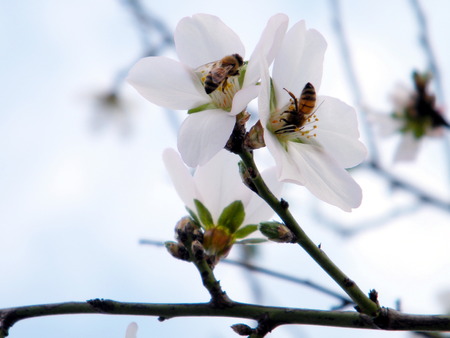Israel Scientists Encouraging Government to Save Wild Bees
July 19, 2017
Bee Colony Collapse, Honey Bees
With the current threats facing bees and other pollinators, including pesticides, diseases, and habitat loss, various nations and leaders are doing what they can to help increase population numbers. At the same time, however, some initiatives can be helpful while others may have unforeseen consequences. For example, the government of Israel intends to pass a bill that will definitely help honeybees—and increase honey production—but at the expense of other wild bee species that are just as important to the environment and pollination.
Wild Bees of Israel
Should this bill pass as is, it would allow the nation’s Board of Honey Production and Marketing to set hives wherever it wants for increasing the domestic honeybee population. On the other side of that coin, scientists want their government to prohibit honeybees from being farmed within the vicinity of parks and nature reserves. Otherwise, the honeybees could disrupt other wild bee populations, which are under enough stress from various other factors, and it could lead to local wild bee extinctions.
Understanding these consequences, several environmentalists and scientists are pleading with parliament to keep control of where honeybees can be placed with the Israeli Nature and Parks Authority, which is said to be more environment-minded. "The council's exclusive interest is to produce as much honey as possible," said Dr. Achik Dorchin, who is a Hebrew University of Jerusalem postdoctoral student. "They want there to be no limitation on 'grazing' by honeybees. They have no concern for nature." Dorchin specifically wants lawmakers to understand what is at stake with their vote—like tomato plants.
Why Wild Bees are Important
According to Tamar Keasar, a professor with Haifa University, there aren’t any long-standing records detailing whether or not native bees’ numbers are increasing, decreasing, or maintaining—in Israel or otherwise. However, two surveys, one from 2002 and another more recent one, show the frequency of honeybees has risen to 70 percent from 30.
While it’s not certain if the increased number of honeybees has diminished wild bee populations, Keasar does stipulate wild bee species are vital for ecology and human nourishment. Specifically, these bees are “specialty” pollinators. "We need wild bees for the niches where domestic bees won't go. Tiny flowers and exotic cacti are like that too," she said. With tomato plants, for example, honeybees are physically incapable of pollinating them (the nectar and pollen are inside the plant) while wild bees can, because they can vibrate their bodies and cause the nectar and pollen to release. "If you cultivate domestic bees and ignore all else, bad things can happen," Keasar said.
The Solution
A possible amendment would be, according to Dr. Dorchin, to focus on protected areas, which is where the Nature and Parks Authority is mandated to safeguard nature. The bill could impose two-kilometer-wide honeybee buffer zones that would surround these protected areas, which feature wild bees and rare plants. This would reduce the density of honeybees in the area while allowing wild bees to build their numbers back up with minimal stress. It may not solve all the problems facing bees, but it would be a start.
Copyright: emkaplin / 123RF Stock Photo


.jpg)




